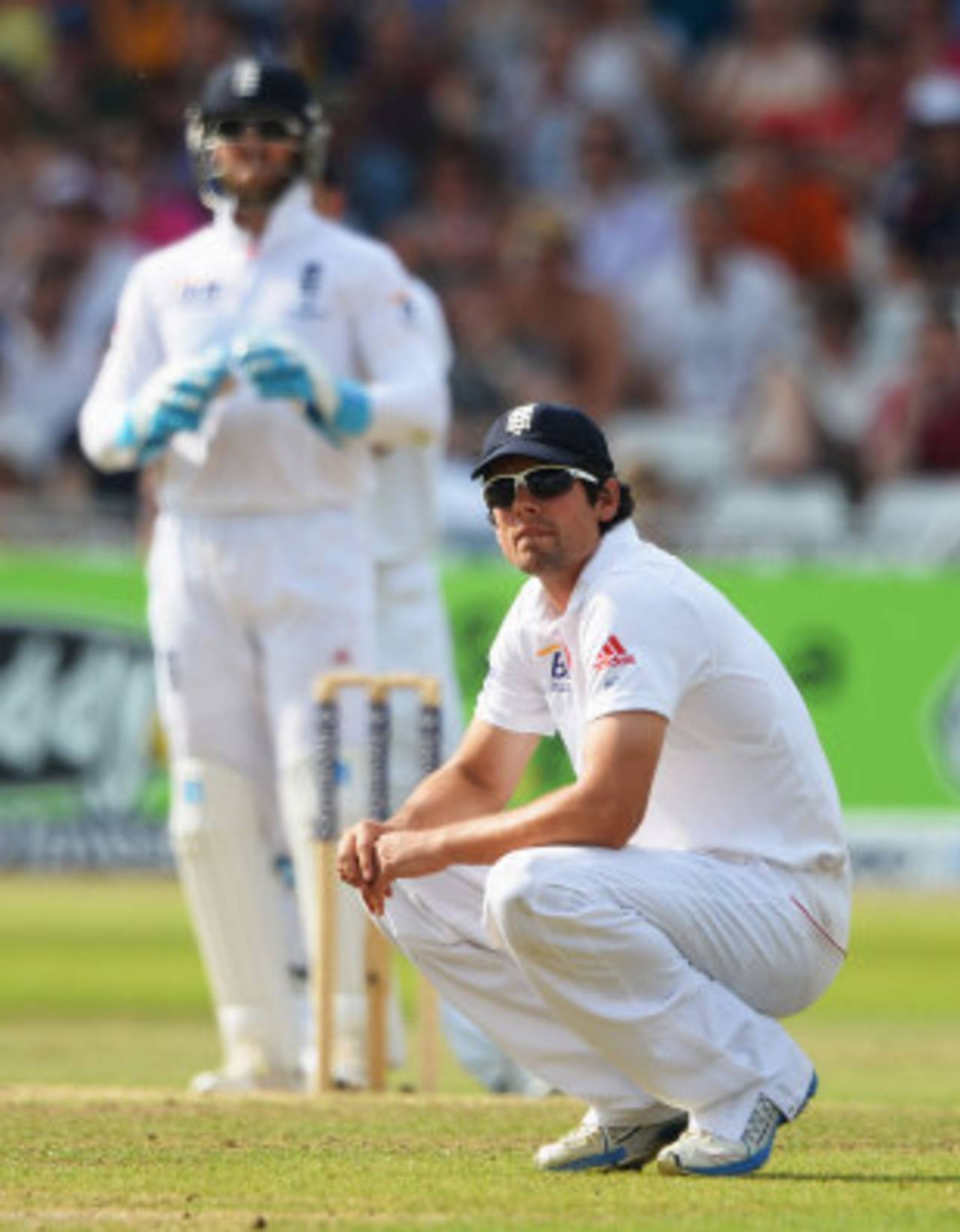Leave the DRS to the umpires
Instead of limiting the number of referrals, and leaving them in the hands of the players, the use of reviews should be solely at the discretion of the umpires
Ian Chappell
Jul 14, 2013, 2:44 AM

Cook has displayed a remarkable ability to adapt as a batsman. Now he has to adapt as captain • Getty Images
Captaincy debates and umpiring controversies are never far from the surface in a cricket match, and the Test at Trent Bridge has been no exception.
While debutant Ashton Agar was stunning England and amazing the cricket world with his array of shots and nerveless temperament, Alastair Cook was paralysed by indecision. There was a look of panic on his face during the remarkable, record-breaking partnership between Agar and Phillip Hughes that belied the term "being in charge". As a result of Cook's indecision he waited for the Australians to commit cricketing suicide; instead they used their brains and batted bravely.
A former New South Wales player once told me one of the secrets of Richie Benaud's captaincy success was his ability to appear calm under all circumstances. "He'd casually stand there in the gully with his arms folded," said the player, "and then suddenly he'd shift a fielder or two and change the bowling and we'd all think, 'This is the move that's going to alter the game.'"
That ability as a captain, to appear calm no matter how dire the situation, sends a wave of confidence through the fielding side and tells the batting side nothing.
Cook has displayed a remarkable ability to adapt as a batsman; he's gone from being a potential liability prior to the 2010-11 Ashes series to a wicket Australia covets. Now he has to display that same ability to adapt as a captain, but this time it'll be more difficult; his batting needed a simple alteration in technique, the captaincy will require an adjustment to his temperament. It's always difficult to drastically alter what is nature's gift.
Cook's other problem is having to adapt mid-series. The amazing turnaround contrived by Agar and Hughes not only rescued Australia in the Test but it has given Australia inspiration for the remainder of the series. Captaincy could play a crucial role if this series remains tight and Michael Clarke is tactically superior to Cook. If the England captain can be frozen into indecision by aggressive Australian batting, that's another advantage to the tourists.
The other major influence on the first Test has been the umpiring. The main controversy has been around the DRS and its failings have emphasised flaws the ICC should have addressed long ago.
Firstly the Jonathan Trott lbw referral highlighted the absurd decision to allow the host broadcasters to play a part in the DRS. In Trott's case the operator was utilising Hot Spot for something else when suddenly the technology was required for a referral.
The DRS should always be the sole responsibility of the cricket boards; they should pay for and operate everything that's required for the decision-making process. Adjudication has nothing to do with the television coverage, which is there to provide entertainment for the viewers.
Hopefully this latest malfunction will convince the cricket boards to take charge of the DRS, and that way every Test will then be played under the same conditions.
Then there's the Stuart Broad controversy over a disputed catch. There's the irony in it of Australia's cause being hurt by an opponent not walking; cricket has a way of even-ing up over time.
More important is the principle of getting the right decision, which the ICC has constantly spruiked as one of the virtues of the DRS. In many cases it has done exactly the opposite, and Broad's case was just the latest example.
Instead of putting a limit on the number of referrals available, and leaving them in the hands of the players, the use of the DRS should be solely at the discretion of the umpires. The arbiters in the middle should be encouraged to make decisions and then, only if the video umpire sees a glaring error, should he intervene.
This way the umpiring standards could be raised and only the howlers, and not the 50-50 decisions, would be overturned. No system is infallible and that's part of the beauty of the game. The players make mistakes, which in turn require the umpires to come to a decision, which can occasionally result in an error. The human element is an important part of cricket's magic.
And so is drama. There has been no shortage of that at Trent Bridge as once again an Ashes series has captured the public attention.
Former Australia captain Ian Chappell is now a cricket commentator for Channel 9, and a columnist